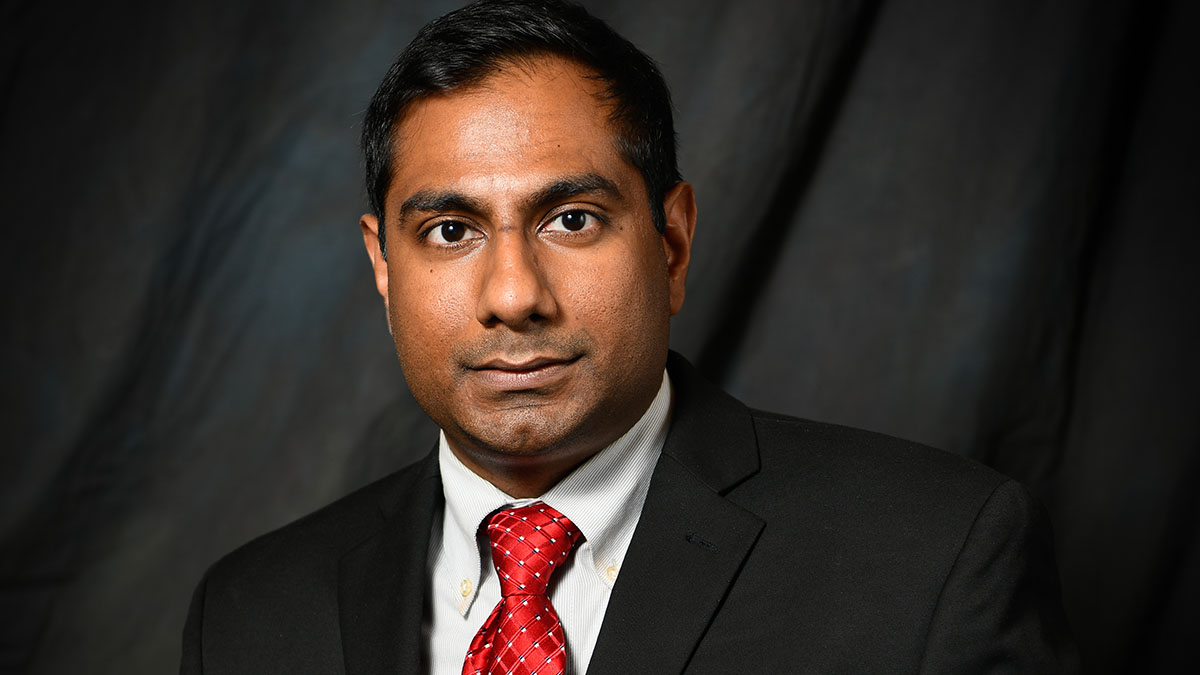Dallas physician finds special relevancy in MPH training during the pandemic
The COVID-19 pandemic has taken a definite toll on healthcare providers. Months of working long hours under endless challenges to protect patients and comfort their families while looking after their own health and the health of their loved ones at home has not been easy.
HSC alumnus Sreekanth R. Cheruku, MD, an Assistant Professor in the Department of Anesthesiology and Pain Management at UT Southwestern Medical Center in Dallas, has worked on the front lines since the pandemic first hit Texas last March.
Dr. Cheruku specializes in cardiothoracic anesthesiology and critical care medicine and serves as Principal Investigator of the UT Southwestern site of the VIRUS study, an international, multi-center study of COVID-19 patients. He completed his MPH through the HSC School of Public Health in December 2020. His research focuses on identifying and mitigating risk factors for adverse outcomes after cardiac surgery, and his special interests include global health, economics, health politics and policy, and finance.
The balance of career and graduate school has been an up and down journey, he said, especially during the pandemic.
Dr. Cheruku was assigned to Southwestern’s COVID-19 ICU at the beginning of March. Along with 11 other intensive care physicians, both anesthesiologists and pulmonologists, he treated patients suffering from the most severe effects of the disease, often requiring mechanical ventilation or an emergency procedure called ECMO, which serves as an artificial lung, pumping blood through an oxygenator to sustain a critically ill patient.
“While this was a departure from my normal work with post-cardiothoracic surgical patients, I have been able to adapt some of the tools from previous clinical experiences to take care of COVID-19 patients,” he said.
Tough conversations with family members have been part of the journey as well.
“For our patients and families, the biggest challenge has been not being able to see each other during COVID isolation, adding significant hardship to what is already a difficult experience,” he said. “We were fortunate though, in that we already had video conferencing capabilities in the ICU, which helped them stay connected.”
Along the way, there have also been the types of conversations no one wants to have, regarding healthcare wishes of the patient and end-of-life decisions. Pain, grief and saying goodbye are heavy burdens to manage through those very sad times.
“In our COVID-19 ICU, every single provider — physicians, nurses, respiratory therapists, pharmacists, physical therapists and other professionals — managed their job admirably despite the personal risks and possible exposures to their families. The hospital system was well prepared with medical supplies as well as resources for counseling and other provider support,” he said.
As with other communities around the world, Dr. Cheruku said, North Texas pandemic experiences have been greatly affected by health disparities and access to care among disproportionately represented populations.
“COVID’s impact on communities has significantly differed based on socioeconomic factors. Among those able to work from home and isolate effectively, the impact may be psychological, but within communities where members have jobs that cannot be performed remotely, people have faced the choice between exposing themselves to the disease or losing their livelihood.”
For individuals in these populations with chronic health conditions like diabetes, hypertension and others, Dr. Cheruku said, effects of the virus have been considerably more severe.
“It will take comprehensive changes to reduce these disparities for future infectious epidemics,” he added. “It should be expected that other novel viruses will arise over time, and preparedness is very important for all communities,” he said.
Adding the MPH degree to his credentials was important to Dr. Cheruku for several reasons. He was inspired by his mentor, Dr. Amanda Fox, a fellow cardiothoracic anesthesiologist with an MPH who leads an NIH-funded study involving cardiac surgery patients. He hopes to lead similar studies in the future.
The skills he gained through HSC’s curriculum – in epidemiology, biostatistics, ethics and informatics – are leading the physician toward “the kind of future” he sees for himself. Already, he has applied learnings from the Public Health Ethics course toward a recently-published paper on “Cardiopulmonary Resuscitation in ICU patients with COVID-19.”
“Now more than ever, I think every physician should at least have a basic understanding of public health practice, to better educate patients and provide optimal care,” he said.
“The perceived distance between medical practice and public health has vanished as a result of the pandemic. Those of us on the front lines of COVID-19 have relied daily on public health tools including testing, surveillance, isolation and community outreach to contain spread of the virus, manage patient care and address prevention.”







Social media